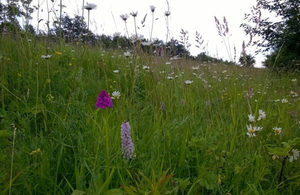Seed of success for A19
Orchids and bumblebees have benefitted from green-fingered roadworkers on the A19 and the work has cultivated in a top environmental award.

Image showing flowers by the A19
Sections of the A19 dual carriageway travel through the County Durham Magnesian Limestone belt, an area of unique and internationally important habitat, and Highways England and its contractors Sir Robert McAlpine have worked hard to protect and restore this area.
By discouraging invasive weeds and removing the existing vegetation, the nutrient value of the soil has been lowered, which has created an environment much more suited to desired wildflower species.
The grass cutting has helped create habitat piles and animal refuges, which might look like a stack of branches but make excellent homes for small animals.
The team has now been recognised with an environmental award as part of the CIRIA 2018 BIG Biodiversity Challenge Awards which took place in London.
Highways England’s route manager Ben Dobson said:
This is a fantastic achievement not just for the team but for wildlife along the A19. By carrying out this work we have increased the amount of rich grasslands to 115 sites.
We have also been working closely with Durham Wildlife Trust to see what further improvements we can carry out along the route to create more wildflower meadows on the A19.
Keith Polson from Sir Robert McAlpine who maintain the A19 between Dishforth and the Tyne Tunnel, said:
We are proud to have received this award, which recognises both the commitment of Highways England and Sir Robert McAlpine to responsibly managing our environment and the collaborative working relationship we enjoy.
Mark Dinning, Head of Conservation, from Durham Wildlife Trust said:
We are pleased to be working in partnership on a scheme bringing benefits to such a nationally important habitat as the Magnesian Limestone grassland. This project has connected and restored valuable wildlife sites and unearthed what is a truly special resource of plants and insects which are benefiting under Sir Robert McAlpine’s and Highways England’s stewardship.
Highways England is committed to a national Biodiversity Plan which is being supported by a £30 million national investment programme over the next five years.
The plan recognises road verges and associated land can be managed to provide areas of habitat, relatively free from human access that may be scarce in the surrounding landscape.
General enquiries
Members of the public should contact the Highways England customer contact centre on 0300 123 5000.
Media enquiries
Journalists should contact the Highways England press office on 0844 693 1448 and use the menu to speak to the most appropriate press officer.